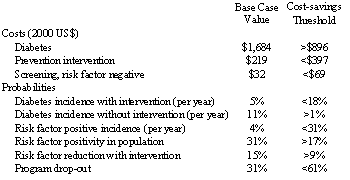|
||||
Tuesday, October 23, 2007
P3-5
COST-EFFECTIVENESS ANALYSIS OF COMMUNITY-BASED EFFORTS TO PREVENT DIABETES
Methods: We constructed a Markov decision model to compare a modified curriculum of the Diabetes Prevention Program (mDPP), which relaxes the inclusion criteria of the original intervention, with usual care for adults. Outcomes included cost in 2000 US dollars, quality-adjusted life expectancy, and cost-effectiveness in costs per quality-adjusted life year (QALY) gained. Intervention costs and outcomes were obtained from two ongoing, community-based diabetes prevention interventions. Other cost and disease progression data, mortality from diabetes and its associated risk factors, and utilities were drawn from the published literature. Future costs and effectiveness were discounted at 3% per year.
Results: Over the 3 year time horizon of the model, an mDPP that decreases risk factor positivity by 15% was cost-saving with respect to usual care while gaining 0.0142 QALYs (approximately 5.2 days). In 1-way sensitivity analyses, the intervention was not cost-saving when parameters were varied as shown in the table; results were most sensitive to diminished risk factor reduction with the intervention. In a probabilistic sensitivity analysis, the intervention was cost-saving in 52% of model iterations and cost <$20,000/QALY gained in >96% of model iterations.
Conclusions: Community-based mDPP should be considered to be a sound investment.


